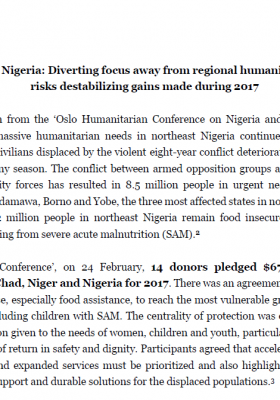Oslo Consultative Group on Prevention and Stabilization in the Lake Chad Region
Key Recommendations
We ask stakeholders from the ‘Oslo Conference’ to follow-up on the full range of commitments made during the conference, and consider the worsening humanitarian situation in addition to stabilization discussions.
Step 1: Put Protection of Civilians at the Centre of Response
We call for all parties to the conflict to uphold international humanitarian law (IHL) and ensure that affected populations are being reached with food, water, health and life-saving services.
- Further funding to invest in the development of specific livelihood and prevention strategies;
- Strengthen community based protection mechanisms;
- Develop and implement functional referral pathways.
Step 2: Scale-up the Food and Nutrition Response in Nigeria and the Region
We call for greater coordination and communication between all actors.
- Finalize and roll out clear contingency plans;
- Develop and implement a coordinated multi-sector approach which includes capacity building, strengthening health facilities and community education.
Step 3: Increase Access to More, Better and Safe Quality Education
- Funding should be made available for the following areas; (1) systems strengthening; (2) reconstruction of school buildings; (3) payment and training of teachers; (4) strengthening of community participation;
- Explore alternative solutions to formal education including mobile schools and vocational training programmes;
- Tackle negative perceptions of formal education through community sensitization.
Step 4: Safeguard Humanitarian Space: Safe Movement to Reach more People in Need
We call for unhindered humanitarian access to all communities. Further, we request the government of Nigeria to develop clear procedures on bureaucratic procedures and appoint a focal point.
- Continue funding UNHAS as a crucial life-saving service;
- Invest more resources to facilitate access negotiations;
- Expedited implementation of the newly developed action plan for civil military engagement;
- Draft and finalize Civil-military coordination guidelines without further delay.
Step 5: Strengthen Leadership of the Response and Improve Humanitarian Coordination
We call upon the government of Nigeria to continue to support the response and we stress the need for greater collaboration between all actors.
- Further funding to strengthen the collection and sharing of data, including increasing the number of information managers and better identifying needs and gaps;
- Greater clarification on roles and responsibilities of Sectors and Clusters to improve prioritization, orient operational partners and adapt responses to ensure all actors are contributing to designing a needs based response;
- Develop a clear resource mobilization plan between humanitarian and development actors.
Step 6: Ensure All Returns are Safe, Voluntary and Dignified
While we applaud UNHCR, the Governments of Nigeria and Cameroon for the strides made towards the implementation of the Tripartite Agreement, we urgently call for the immediate implementation of the Tripartite Agreement.
- Strengthen clear coordination channels between the governments and the humanitarian community to provide information to ensure that authorities and humanitarian agencies can provide sufficient services;
- Ensure contingency plans are funded and ready for rapid mobilization;
- Prioritize the roll out of information campaigns highlighting the reality of the situation of the camps to ensure all decisions to move are fully informed.
Step 7: Build Resilience and Increase Local Capacity
While we commend all actors, especially the government of Nigeria, we re-emphasize the need to ensure stabilization measures do not compromise the neutrality and impartiality of humanitarian assistance. While welcoming the development and implementation of a multi-year response plan, we call on donors and governments to allocate both short term and longer term predictable funding.
- Prioritize building of strategic relationships with local organizations, civil society and stakeholders to continue to work together to restore peoples’ dignity, lives and livelihoods;
- Include the affected people in areas as agents of their own change.

1 The Safe Schools Declaration is an inter-governmental political commitment that express political support for the protection of students, teachers, and schools during times of armed conflict. As of July 2017, 68 countries have endorsed the Safe Schools Declaration, including Chad, Niger and Nigeria.
North East Nigeria: Diverting focus away from regional humanitarian crisis risks destabilizing gains made during 2017
Download